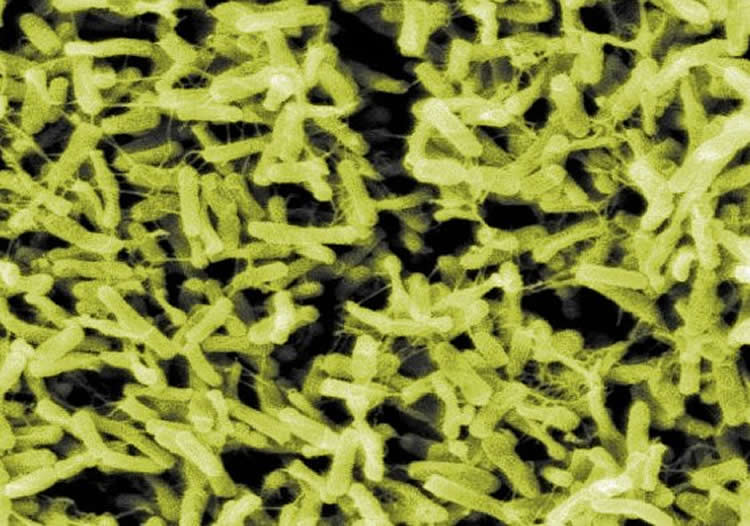A study at Oregon State University indicates that both a high-fat and a high-sugar diet, compared to a normal diet, cause changes in gut bacteria that appear related to a significant loss of “cognitive flexibility,” or the power to adapt and adjust to changing situations.
This effect was most serious on the high-sugar diet, which also showed an impairment of early learning for both long-term and short-term memory.
The findings are consistent with some other studies about the impact of fat and sugar on cognitive function and behavior, and suggest that some of these problems may be linked to alteration of the microbiome – a complex mixture in the digestive system of about 100 trillion microorganisms.
The research was done with laboratory mice that consumed different diets and then faced a variety of tests, such as water maze testing, to monitor changes in their mental and physical function, and associated impacts on various types of bacteria. The findings were published in the journal Neuroscience, in work supported by the Microbiology Foundation and the National Science Foundation.
“It’s increasingly clear that our gut bacteria, or microbiota, can communicate with the human brain,” said Kathy Magnusson, a professor in the OSU College of Veterinary Medicine and principal investigator with the Linus Pauling Institute.
“Bacteria can release compounds that act as neurotransmitters, stimulate sensory nerves or the immune system, and affect a wide range of biological functions,” she said. “We’re not sure just what messages are being sent, but we are tracking down the pathways and the effects.”
Mice have proven to be a particularly good model for studies relevant to humans, Magnusson said, on such topics as aging, spatial memory, obesity and other issues.
In this research, after just four weeks on a high-fat or a high-sugar diet, the performance of mice on various tests of mental and physical function began to drop, compared to animals on a normal diet. One of the most pronounced changes was in what researchers call cognitive flexibility.

“The impairment of cognitive flexibility in this study was pretty strong,” Magnusson said. “Think about driving home on a route that’s very familiar to you, something you’re used to doing. Then one day that road is closed and you suddenly have to find a new way home.”
A person with high levels of cognitive flexibility would immediately adapt to the change, determine the next best route home, and remember to use the same route the following morning, all with little problem. With impaired flexibility, it might be a long, slow, and stressful way home.
This study was done with young animals, Magnusson said, which ordinarily would have a healthier biological system that’s better able to resist pathological influences from their microbiota. The findings might be even more pronounced with older animals or humans with compromised intestinal systems, she said.
What’s often referred to as the “Western diet,” or foods that are high in fat, sugars and simple carbohydrates, has been linked to a range of chronic illnesses in the United States, including the obesity epidemic and an increased incidence of Alzheimer’s disease.
“We’ve known for a while that too much fat and sugar are not good for you,” Magnusson said. “This work suggests that fat and sugar are altering your healthy bacterial systems, and that’s one of the reasons those foods aren’t good for you. It’s not just the food that could be influencing your brain, but an interaction between the food and microbial changes.”
Funding: The study was funded by the National Science Foundation and the Microbiology Foundation.
Source: David Stauth – Oregon State University
Image Credit: Images credited to the CDC and is in the public domain
Original Research: Abstract for “Relationships between diet-related changes in the gut microbiome and cognitive flexibility” by K.R. Magnusson, L. Hauck, B.M. Jeffrey, V. Elias, A. Humphrey, R. Nath, A. Perrone, L.E. Bermudez in Neuroscience. Published online May 13 2015 doi:10.1016/j.neuroscience.2015.05.016
Abstract
Relationships between diet-related changes in the gut microbiome and cognitive flexibility
Western diets are high in fat and sucrose and can influence behavior and gut microbiota. There is growing evidence that altering the microbiome can influence the brain and behavior. This study was designed to determine whether diet-induced changes in the gut microbiota could contribute to alterations in anxiety, memory or cognitive flexibility. Two-month-old, male C57BL/6 mice were randomly assigned high-fat (42% fat, 43% carbohydrate (CHO), high-sucrose (12% fat, 70% CHO (primarily sucrose) or normal chow (13% kcal fat, 62% CHO) diets. Fecal microbiome analysis, step-down latency, novel object and novel location tasks were performed prior to and 2 weeks after diet change. Water maze testing for long- and short-term memory and cognitive flexibility was conducted during weeks 5–6 post-diet change. Some similarities in alterations in the microbiome were seen in both the high-fat and high-sucrose diets (e.g., increased Clostridiales), as compared to the normal diet, but the percentage decreases in Bacteroidales were greater in the high-sucrose diet mice. Lactobacillales was only significantly increased in the high-sucrose diet group and Erysipelotrichales was only significantly affected by the high-fat diet. The high-sucrose diet group was significantly impaired in early development of a spatial bias for long-term memory, short-term memory and reversal training, compared to mice on normal diet. An increased focus on the former platform position was seen in both high-sucrose and high-fat groups during the reversal probe trials. There was no significant effect of diet on step-down, exploration or novel recognitions. Higher percentages of Clostridiales and lower expression of Bacteroidales in high-energy diets were related to the poorer cognitive flexibility in the reversal trials. These results suggest that changes in the microbiome may contribute to cognitive changes associated with eating a Western diet.
“Relationships between diet-related changes in the gut microbiome and cognitive flexibility” by K.R. Magnusson, L. Hauck, B.M. Jeffrey, V. Elias, A. Humphrey, R. Nath, A. Perrone, L.E. Bermudez in Neuroscience. Published online May 13 2015 doi:10.1016/j.neuroscience.2015.05.016







